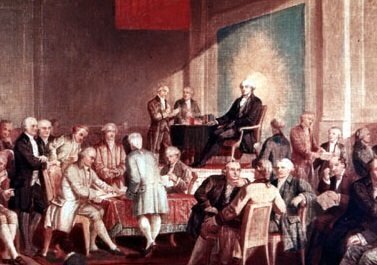Can you handle the truth about the Founders and the Constitution? From the vault of our Constitution Daily blog, here are 10 factoids that will impress your constitutionally minded and history loving friends!
 1. Were the Constitution and Declaration written on paper made of hemp?
1. Were the Constitution and Declaration written on paper made of hemp?
The two great documents were written on parchment. The point of debate is that some working drafts of the documents might have been composed on paper made from hemp, which was widely used in that time period.
That would be Aaron Burr, who represented Maria Reynolds in her divorce case. Hamilton admitted to an affair with Reynolds in an effort to show he wasn’t spending public funds on her. The Reynolds affair ended Hamilton’s likelihood of holding political office again. He remained a behind-the-scenes player in the Federalist Party, but would never become president–and his party wouldn’t win the presidency again in his lifetime.
3. When did the Founders sign the Declaration of Independence?
On July 2, 1776, the Continental Congress agreed to break away from the British. On July 4, the Congress formally adopted the Declaration of Independence. On July 8, 1776 Colonel John Nixon of Philadelphia read a printed Declaration of Independence to the public for the first time on what is now called Independence Square. But the Declaration wasn’t signed by most of the delegates until August 2, 1776.
4. Did Thomas Jefferson refuse to sign the Constitution?
Thomas Jefferson didn’t sign the Constitution because he was in France at the time working for his country. This is the most –popular myth at the National Constitution Center, especially when guests enter our hall of statutes of the Constitution’s signers – and ask where the Jefferson statue is. In 1787, Jefferson was in Paris as the United States’ envoy, and he missed the Constitutional Convention in Philadelphia.
5. Didn’t John Adams also refuse to sign the Constitution?
Adams was in Great Britain at the same time as Jefferson was in France, so he wasn’t in Philadelphia!
6. OK – did the U.S. Senate really refuse to honor Ben Franklin after he died in 1790?
Yes, that is true. Adams and Richard Henry Lee didn’t like Franklin, so tributes to the man were refused, including one from France. However, James Madison made sure Franklin was honored by the House of Representatives.
7. Was George Washington really a moonshiner?
Washington legally distilled whiskey at Mount Vernon and it may have been his most profitable business. But it was all legal, else President Washington would have need to call out the Army to arrest himself!
The famous party at the City Tavern on September 17, 1787 was actually hosted by local soldiers for Washington, and not by his fellow delegates at the convention. The 55 guests pounded down “54 bottles of Madeira, 60 bottles of claret, 22 bottles of porter, beer, hard cider and 7 bowls of spiked punch.” We don’t know how they split the bill!
9. Did Thomas Jefferson jam on the violin?
Yes, the Third President was serious about his music and studied the violin extensively. He also hated the way American music was trending back in 1778 as in “state of deplorable barbarism.” Like many musicians, Jefferson had some attitude.
10. Did Alexander Hamilton cheat in his duel with Aaron Burr in 1804?
That was one theory presented in a 1976 Smithsonian Magazine article when evidence appeared that Hamilton’s pistol was given a hair trigger to give him “the drop” on Burr. It’s never been conclusively proven.






